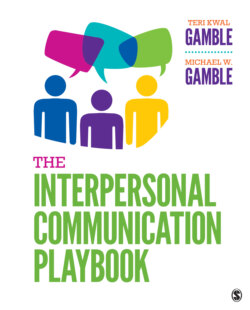Читать книгу The Interpersonal Communication Playbook - Teri Kwal Gamble - Страница 82
На сайте Литреса книга снята с продажи.
Goffman’s Dramaturgical Approach
ОглавлениеThrough his concept known as the dramaturgical approach to human interaction, Erving Goffman explains the role that the skillful enacting of impression management plays in person-to-person interaction.26 If we consider social interaction a performance and the setting in which interaction occurs the stage, then the actors (the people interacting) play their parts to manage the impressions of others sharing the stage with them, so that they, the actors, may achieve their personal objectives. The more skillful the actors, the more effectively they convince others that they are knowledgeable and trustworthy and that they possess a charisma that makes them attractive to others.
We can use several dramatic elements to make the best impression in any given scene. First, we can employ framing, specifically defining a scene or situation in a way that helps others interpret its meaning in the way we desire. Picture this: On a first date, you go on stage when you arrive to meet your date at a restaurant. You are seated and employ framing when you decide how to look and what to do while waiting for your date to arrive. You also use scripting, when you go through standard small talk upon your date’s arrival. As you chat, you are convincing your date to play their role too. Of course, you use engaging dialogue—storytelling together with colorful and descriptive language and effective use of nonverbal cues—to guide your date’s responses. Together, these elements underlie your performance.
When performing, we can also choose from among a number of techniques to encourage others to see us as we wish to be seen. For example, we may use exemplification, in which we serve as an example or act as a role model for others; promotion, in which we elucidate our personal skills and accomplishments and/or a particular vision; face-work, in which we take steps to protect our image by reducing the negative aspects of ourselves visible to others; or ingratiation, in which we employ techniques of agreement to make others believe us to be more attractive and likable and less threatening, harmful, or pernicious.
Describe a performance, face-to-face or online, that you or another person you know has enacted in an effort to come off as authentic. Were you or the other person successful? Were you or the other person authentic? How do you know?
Try This: The “Authentic” Self
How do you define authenticity? What does the word mean to you? Can a person who decides to act authentically still be authentic? Do you know anyone who engages in “calculated authenticity,” consciously managing others’ impressions of him or her? Such a person effectively turns human interaction into a staged performance. Is this what we do on Facebook or Instagram—brand ourselves in such a way that others find us authentic?
Track your Facebook or Instagram activity for a week. What messages do you think your posts send to others regarding your self-image and its authenticity? Might there be a benefit to opening yourself up to other possibilities of who you are and who you might grow into in the future?
Source: See Stephanie Rosenbloom, “Authentic? Get Real,” New York Times, September 11, 2011, pp. ST1, ST2, and Michael Puett and Christine Gross-Loh, “The College of Chinese Wisdom,” The Wall Street Journal, Saturday/Sunday, April 2–3, 2016, pp. C1, C2.
